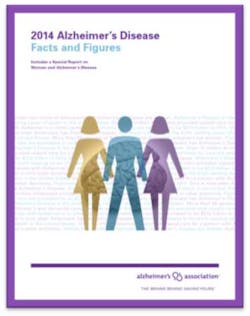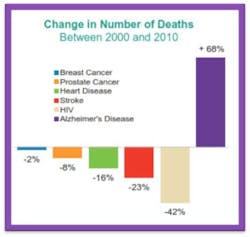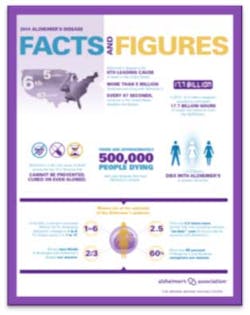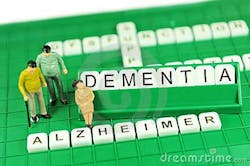We often hear about loved ones or patients slipping away from reality. Sometimes, but not often, it can happen at a young age. I have had patients come into the office and tell me they have been diagnosed with Alzheimer’s disease. There are no words to explain how I felt when someone who seemed perfectly “normal” had to tell me they were slipping away from reality and life. Their self-care then takes a bad turn, and before long they come to the office with a caregiver, then not at all. I remember it well.
"2014 Alzheimer’s disease Facts and Figures" is a statistical resource for U.S. data related to Alzheimer’s disease, the most common type of dementia, as well as other dementias. It also discusses women and Alzheimer’s disease.(1) Dementia is an overall term for diseases and conditions exhibiting a decline in memory or other thinking skills that affects a person’s capability to perform ordinary activities. Dementia is caused by damage to neurons in the brain, resulting in neurons that can no longer function normally, often leading to cell death.
This, in turn, can lead to changes in a person’s memory, behavior, and ability to think clearly. In Alzheimer’s disease, the damage to and death of neurons eventually impair one’s ability to carry out basic bodily functions such as walking and swallowing. In the final stages of the disease, people require 24-hour care and may be unable to get out of bed. It is eventually a fatal disease.
As with other diseases and conditions, women are affected by Alzheimer’s disease differently and disproportionally than men. About two-thirds of those affected are women.(1) As well, more women are caregivers than men. A woman's estimated lifetime risk for developing Alzheimer's is 1 in 6, and for breast cancer it is 1 in 11 while in her 60s.
For information on brain awareness week and the global G8 dementia summit, visit the website.(8)
References 1. Alzheimer’s Association. 2014 Alzheimer’s disease Facts and Figures: Includes a Special Report on Women and Alzheimer’s disease. http://www.alz.org/alzheimers_disease_facts_and_figures.asp. 2. http://www.alz.org/documents_custom/ff_infographic_2014.pdf. 3. http://www.alzheimers.org.uk/site/scripts/download_info.php?fileID=1782. 4. http://www.dentistryiq.com/articles/gr/print/volume-1/issue-3/original-article/alzheimerrsquos-disease-and-periodontal-diseasemechanisms-underlying-a-potential-bi-directional-relationship.html. 5. Poole S, Singhrao SK, Kesavalu L, Curtis MA, and Crean S. Determining the presence of periodontopathic virulence factors in short-term postmortem Alzheimer's disease brain tissue. J Alzheimers Dis. 2013 Jan 1; 36(4):665-77. doi: 10.3233/JAD-121918. 6. Chalmers J and Pearson A. Integrative Literature Reviews And Meta-Analyses. Oral hygiene care for residents with dementia: a literature review. Journal of Advanced Nursing 52(4), 410–419. 2005. 7. Mancini M, Grappasonni I, Scuri S, Amenta F. Oral health in Alzheimer's disease: a review. Curr Alzheimer Res. 2010 Jun; 7(4):368-73. 8. http://www.biomedcentral.com/biome/tag/brain-awareness-week/.











